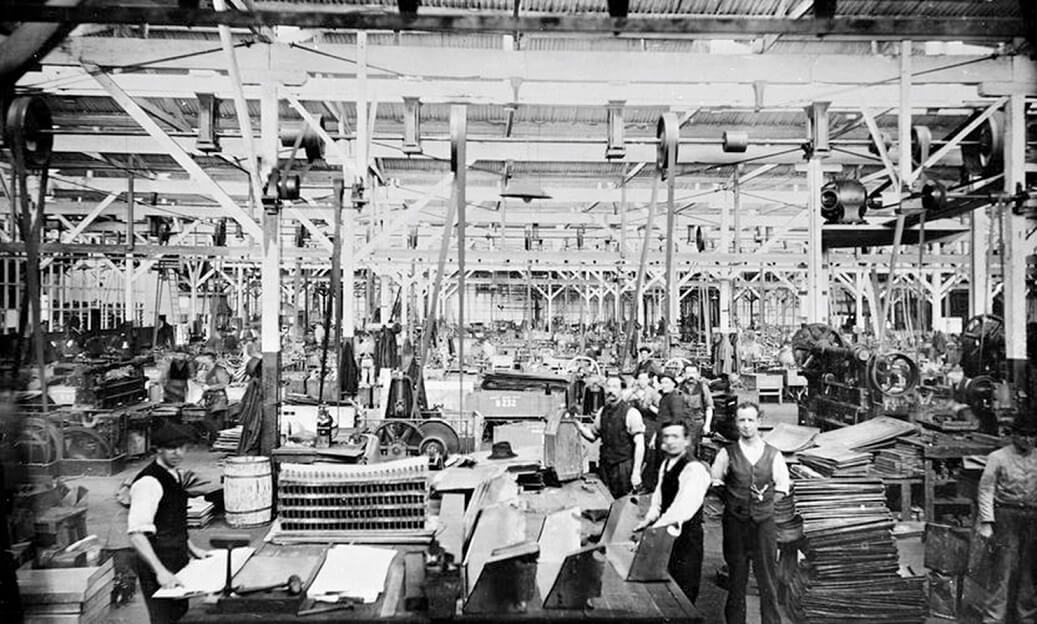The Sunshine Harvester agricultural machinery works was another huge industrial complex, eventually employing thousands of workers in regional Victoria. H.V. McKay began manufacturing ‘Sunshine’ stripper-harvesters in Ballarat in 1896. In 1906-7 he relocated his works to Braybrook Junction, near the junction of the northern and western railway lines to the west of Melbourne. The town was renamed Sunshine in honour of the works. McKay’s aim in relocating was twofold — to reduce transport costs for his raw materials and products and to evade the authority of the wages boards that regulated the wages of workers in Ballarat. In a large area of land, he built factory buildings and workers’ housing and the complex expanded rapidly. In 1907 McKay employed 400 workers: by the mid-1920s there were more than 2,000. But it was not necessarily a contented workforce and in 1907 the Sunshine works was the focus of arguably the most famous wages case in Australia’s history.
The Harvester judgement
The new Commonwealth Government, under Prime Minister Alfred Deakin, had passed legislation obliging employers to pay ‘a fair and reasonable wage’ to workers. A special Federal Conciliation and Arbitration Court was created to hear wage cases. In 1907 Justice H.B. Higgins determined that the minimum wage for a male worker at the Sunshine Harvester works should be set at seven shillings per day, or 42 shillings per week, with higher wages for skill. In his so-called Harvester judgement, Higgins explained that this wage was designed to allow a (male) worker to support a family of five and live ‘as a human being in a civilized society.’ For the first time a wage was set with the needs of the worker in mind, rather than the profitability of a business. McKay was furious and immediately closed his works, pending a successful appeal to the High Court. But industrial unrest continued in his factory and in 1911 a bitter strike and following lock out resulted in the longest industrial dispute in Victoria’s history to that point.
Sheet Iron department, Sunshine Harvester Works, early 20th century
Reproduced courtesy Museum Victoria
‘Fairy tappers’ and ‘dolly boys’
The Sunshine works was a huge complex with many different workshops. It was so large that managers travelled between shops by bicycle. The section shown here is the sheet metal department, which employed both skilled tradesmen (sheet metal workers) and assistants. Sheet metal workers shaped the metal sheets for machinery using hammers and other tools, shaping the metal sheets with many tiny taps of the hammer. As a result they were sometimes known as ‘fairy tappers’. Metal workshops were very noisy workplaces and industrial deafness was a common complaint. No protective equipment was provided in the early days.
Boys also worked in the Sunshine factory, as apprentice metal workers and as ‘dolly boys’. The dolly boy’s job was to place rivets in holes in the grain box of headers.
Each rivet was held in place by a ‘dolly’. Other workers then hammered the rivets in place from the other side. It was noisy and dangerous work, as one former worker told researchers from Melbourne’s Living Museum of the West in 1987:
Most of the work done with the dolly was in the grain-box which was over the top of the wheel on the header, and all the grain went into the box ... The boy had to get in the box, surrounded by iron, finished with an iron roof, he had a little hole to get out of ... and he'd get a handful of rivets, he'd put a rivet in a hole, put the dolly on it, then the bloke outside - Bang! Bang! Bang! - with the hammer. Then while he was finishing off, the boy'd have to get the next one ready and of course, sometimes he might be a bit slow or just learning and the bloke outside'd go bang! And the boy'd have his finger on it... Most of us started as dolly-boys and we'd have to put in about 600 rivets in an eight-hour day, all day, over our heads, laying on our backs ... And this is the basis for a lot of industrial deafness ... In those early days when we'd come out and our ears were ringing at the end of the day being in a box all day.

